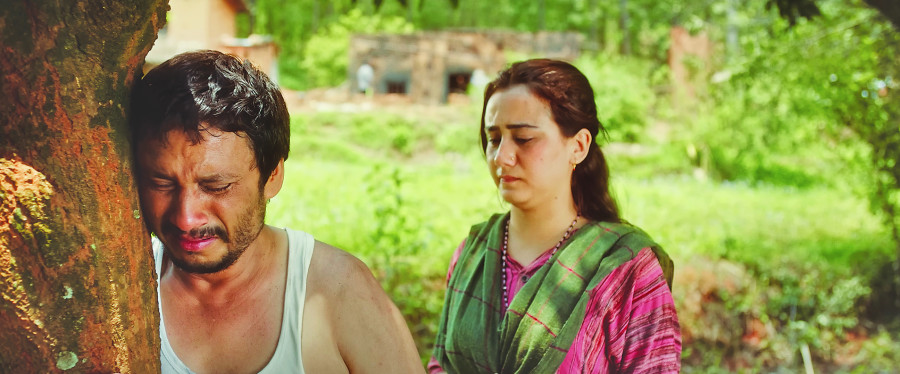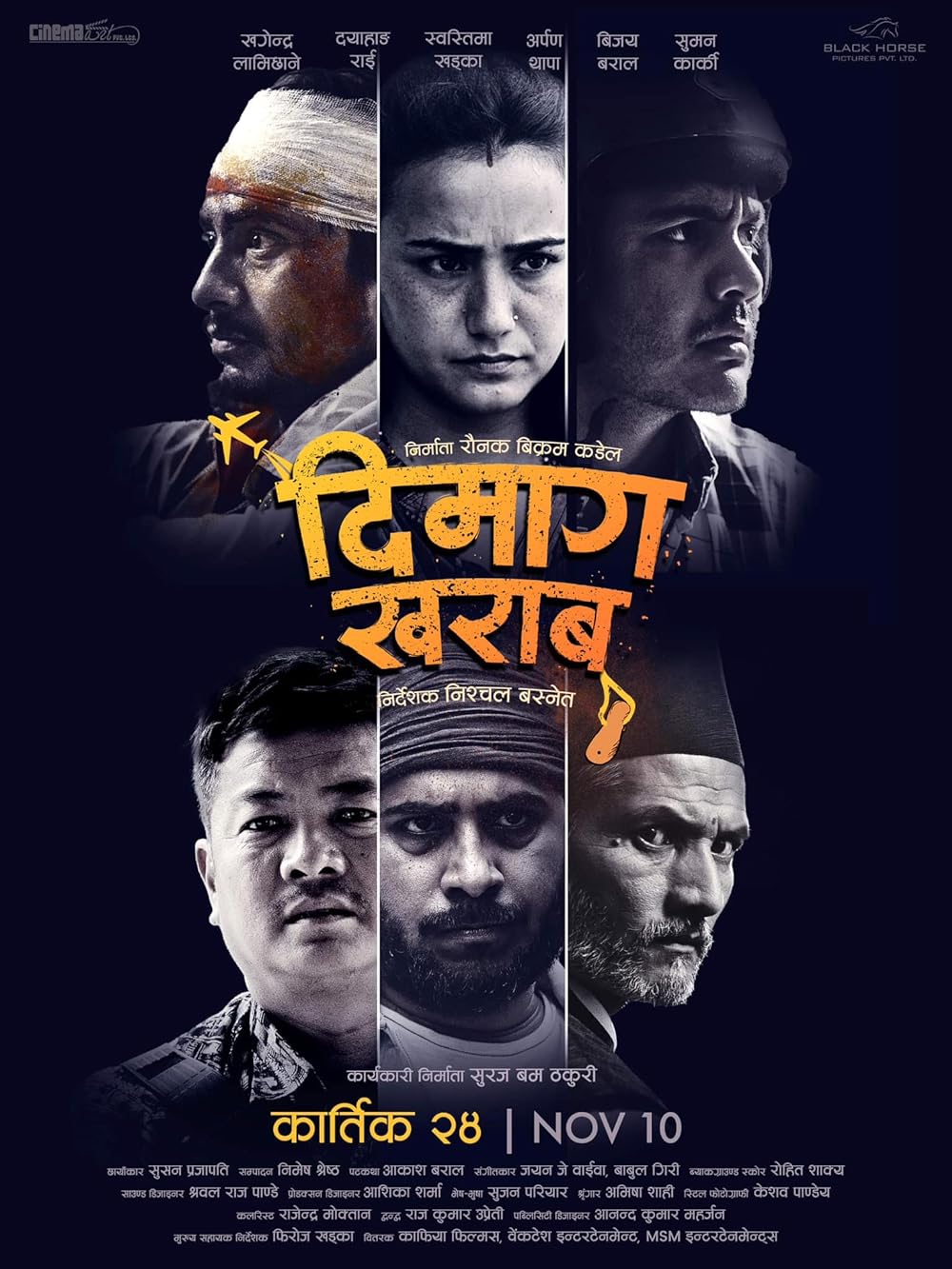Movies
A gripping plot, weakened by a shifty script
Nischal Basnet’s ‘Dimag Kharab’ is a compelling social drama where a simple man navigates political deceit, personal sacrifice and social injustices.
Manushree Mahat
Watching certain films in the theatres is a memorable experience, much like ‘Avengers: Endgame’, or most recently, ‘Jawan’. Although a part of you accepts that the film is far from perfect, you get engulfed in the unadulterated joy of rooting for something or someone, accompanied by the loud hoots and claps of the audience. This sums up the experience of watching ‘Dimag Kharab’, the Nischal Basnet-directed social drama that tells the story of a simple man, Indra (Khagendra Lamichhane), in his quest for justice after he is duped by the selfish and comically villainous Mayor, Hari Prasad (Arpan Thapa).
There is just something truly satisfying about watching an actor shining in his comfort zone, and Lamichhane does just that in this film. Indra is a simple and naive man who struggles to fulfil the financial needs of his family. With aspirations for better financial stability, he applies and is accepted to work abroad, much to his family’s delight. However, due to political agendas and betrayal, his acceptance and tickets are revoked, forcing him to return home in utter humiliation. In a twist of fate (or perhaps not), we discover that the company responsible for duping Indra and others like him is none other than that of the mayor.
As Indra’s world comes tumbling down with the realisation that he and his family have been taken advantage of, he puts himself in the line of fire by announcing his mayoral candidacy. Lamichhane’s versatility shines as we witness Indra’s transformation from a simple, humorous man to a defeated, vengeful figure. His deepening awareness of societal injustice propels him past a point of return. His demeanour changes from cheerful optimism to seething anger and despair. This transformation is vividly captured as we see his eyes reddened with emotion when he publicly confronts Hari Prasad, slapping him with a chappal in front of an audience.
Director Basnet doesn’t hesitate to put his main character through the wringer. Indra is beaten by a mob, jailed for several days, his best friend is wrongfully accused of fraud and jailed, his house is set on fire, he is betrayed by the snakes of politics, he is almost kidnapped, and his daughter actually gets kidnapped. Basnet employs the same kind of direction we’ve come to associate with his films: a fast-paced, entertaining narrative that occasionally resorts to flashbacks to show the farce of a shocking betrayal. In this case, the political contexts of the storyline add strength to the twists, as Aakash Baral’s writing is highly focused on showing the warped world of politics.
However, this doesn’t always stay in tune with the storytelling. While the film aims to capitalise on its potential as a political thriller, the impact of the betrayals and twists can be more hard-hitting when we’ve spent enough time with the characters. This sentiment is particularly evident in Suman Karki as Niraj Gaudel, a youth political commentator constantly seeking the camera as the voice who vehemently opposes the corrupt likeness of Hari Prasad. Karki delivers his lines with the humour of someone who understands comedy, but Gaudel’s character could have been more satisfying if we had witnessed more of his manipulative and two-faced nature in action.
One aspect of the film that bothered me was the excessively dramatic camera work. In certain scenes, such as the one mentioned earlier, the video editing team seemed to believe that repetitive slideshows would emphasise the script’s message. Unfortunately, this approach doesn’t work and, instead, diminishes the impact of the memorable performances.
On a positive note, the cinematography and writing effectively capture the close-knit community of the village and the outwardly polished lifestyle of the villains. When Indra’s house is burned, villagers offer help, and despite their own financial struggles, Bhola’s father provides monetary support. They also rally in support of Indra during election parades, showcasing a strong sense of mutual support—a sharp contrast to the unstable relationship between Hari Prasad and his assistant, played by Bijay Baral.
The atmosphere during the Mayor’s on-screen appearances is intense, blending comic elements with melancholy. This portrayal adds an entertaining and satirical dimension to the villains’ storyline.
There are moments of commendable cinematography, such as the shot where Hari Prasad’s silhouette is blurred with a focused chessboard.
However, the villains in the story lack depth and a complete character arc. Despite attempts to depict Hari Prasad planning to sabotage Indra, the filmmakers offer minimal insight into the villains. Hari Prasad’s personality can be summed up in two words: narcissistic and selfish politician. Often donning black sunglasses, perhaps symbolising his blindness to people’s struggles, he maintains a perpetually menacing expression. Recall the comical portrayal of villains mentioned earlier? This extends to Baral’s character, who juggles roles as the Mayor’s personal bodyguard, an unsuccessful political strategist, and most notably, my favourite, the punching bag.
Every interaction between the two involves insults, slaps, kicks and beatings, with the man enduring it all with the self-respect of a doormat. While these scenes generate intended chuckles, understanding the reason behind his unconditional loyalty to Hari Prasad could have added depth to both characters.
However, the same cannot be said for Sachhi, the family’s sole earner who is married to Indra. When Indra decides to enter the complex world of politics, she recognises the associated dangers. Despite Sachhi’s disapproval of Indra’s newfound passion, we empathise with her concerns. Her anger and uncertainty are not portrayed negatively. Swastima Khadka as Sachhi is authentic, revealing the beaten-down mindset forced upon her by poverty, with her worry about their daughter’s future fueling her anger.
When their house is burned by Indra’s political rivals, Sachhi chooses to stay with Indra and rebuild their home together. This moment significantly highlights Sachhi’s resilience. Despite the option to permanently leave Indra and live with her seemingly better-off parents, she emerges as a loving, independent, supportive and courageous character, making choices for herself.
One of the movie’s highlights is the heartfelt friendship between Indra and Bhola (Dayahang Rai). Bhola is the kind of best friend everyone needs—Indra’s biggest supporter. He cheers for Indra’s candidacy, actively participates in the campaign, and bears no grudges even when jailed because of Indra’s political involvement. Rai as Bhola is simple and unassuming. The banter between Indra and Bhola evokes genuine smiles, showcasing the authentic on-screen chemistry between Lamichhane and Rai.
On the flip side, the ending seemed quite abrupt. It seemed as if, in their attempt to weave complex storylines, the filmmakers were uncertain about how to neatly wrap it all up. ‘Dimag Kharab’ isn’t flawless, but the remarkable performances and the cinematic experience of watching it in theatres make it worth seeing.
Dimag Kharab

Director: Nischal Basnet
Cast: Khagendra Lamichhane, Swastima Khadka, Dayahang Rai, Arpan Thapa, Bijay Baral, Suman Karki
Year: 2023
Duration: 2 hours 30 minutes
Language: Nepali




 11.01°C Kathmandu
11.01°C Kathmandu











